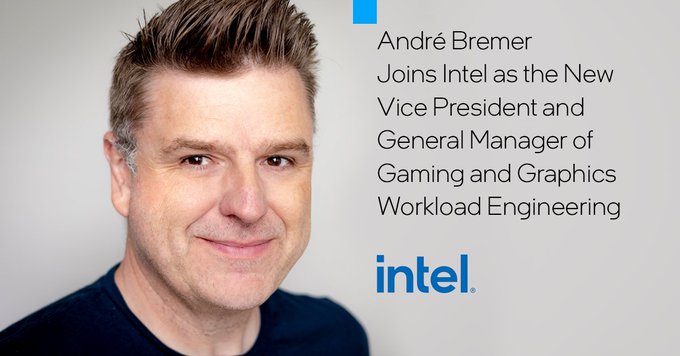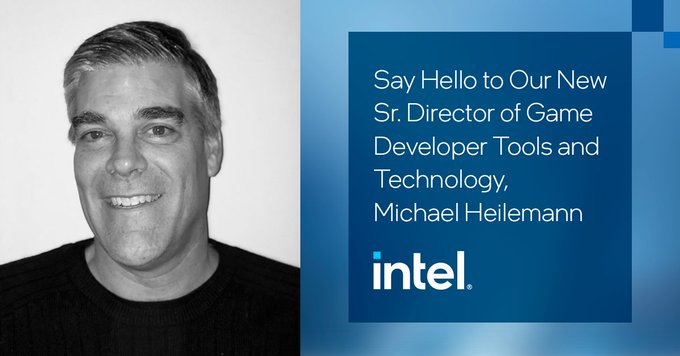Intel Goes on Game Dev Hiring Spree Before Alchemist Gaming GPU Launch
"Developers, developers, developers!"
Intel announced that it has hired four leading game developer advocates as it prepares to launch its first high-performance discrete gaming GPUs, the Arc Alchemist. Developing and launching a new hardware product is a strenuous process with millions of moving parts - both with the hardware development and qualification side of the equation, as well as developing the software stack that actually allows the hardware to be tapped into by developers and finally enjoyed by users. While Intel is yet to throw its hat on the high-performance discrete gaming GPU market with its Alchemist and future products, the company knows what it needs to do to increase the chances of a successful launch. As Steve Balmer so eloquently put it, it's all about developers.
One requirement is pretty simple: Intel's GPUs will not be deployed in a vacuum. While Intel is most certainly building upon its iGPU driver stack, its discrete graphics implementation provides a wholly new architecture. To further these types of efforts, companies like AMD and NVIDIA both maintain developer outreach and support programs. This can sometimes translate to the mere sending of documentation and remote collaboration, but sometimes also implies the allocation of engineers to developers to help with game performance optimization and compatibility. And judging from Intel's recent hires, the company feels that it still has work to do with developer outreach.
Over the last four days, Intel, via one of its official Twitter channels, announced that it had hired four senior positions related to developer outreach, developer relations, and developer-facing tool development.
The first hire announcement (dated September 14th) was André Bremer, who joined Intel as the new Vice President (VP) and General Manager (GM) of Gaming and Graphics Workload Engineering (all of these positions are more than a mouthful). Bremer brings decades of experience in the gaming and developer industry, having previously worked at Prime Gaming, Amazon Web Services' Game Tech, Zynga, EA, and LucasArts.

A day later, on September 15th, Intel announced it has hired Michael Heilemman (CTO of Maxis and Electronic Arts) for the position of Senior Director of Game Developer Tools and Technologies. According to Intel, Heilemman has been involved with the development of no less than 60 AAA games - this is a person who is perfectly acquainted with developer culture, bringing years of experience to the grueling task of making lives as easy as possible for developers in integrating and optimizing for Intel's high-performance graphics architecture.

The next hire, announced September 16th, was Ritche Corpus - an AMD veteran of 15 years - for the position of VP & GM for the Game Ecosystem Business Development & Developer Relations. Ritche Corpus brings a wealth of connections to Intel, having previously been involved with the PC Gaming Alliance as a part of its Board of Directors and as Treasurer. His resume points towards a strong software inclination.

Finally, Intel today also announced the hiring of Steve Bell for the position of Senior Director of Gaming Developer Relations. This is one of those cases where a company's gain is another's loss - Steve Bell goes to Intel straight from AMD, after more than 13 years in exactly the same capacity as he now joins the Blue Giant.

Hardware doesn't work without the software, and the difference between a good user experience and good hardware performance rests mostly on competent software solutions. Through these hires, Intel is extending its reach throughout the developer community, without whom the high-performance graphics architecture for Alchemist (and its future iterations) would translate as little less than expensive paperweights.
Judging by the general perception of the NVIDIA vs AMD driver quality debate, and the number of consumers who claim to prefer the former over the latter, Intel will probably do everything it can to avoid a bad public perception. It's great to have your graphics cards earning the "fine wine" label due to performance improvements that come over a long period of time, but it's even better to hit the ground running with a great developer and public perception. Intel has the money, and it is clearly willing to hire people for the job. We'll see how all this translates on Alchemist's actual launch.
Get Tom's Hardware's best news and in-depth reviews, straight to your inbox.

Francisco Pires is a freelance news writer for Tom's Hardware with a soft side for quantum computing.
-
bigdragon When I saw the headline, I was hoping Intel had started a game development studio to produce PC games optimized for their new GPU hardware. Looks like what really happened is that a new outreach team has been stood up. Not quite what I was hoping for. Looks similar to what Nvidia and AMD do with PC games that are biased to perform better on one brand's hardware.Reply
I think Intel has the most incentive to start up a dedicated PC gaming studio of all the GPU manufacturers. They have no console business like AMD and Nvidia have. The industry desperately needs games that fill the gap between over-monetized AAA casino games and indie experiences. -
abufrejoval Replybigdragon said:When I saw the headline, I was hoping Intel had started a game development studio to produce PC games optimized for their new GPU hardware. Looks like what really happened is that a new outreach team has been stood up. Not quite what I was hoping for. Looks similar to what Nvidia and AMD do with PC games that are biased to perform better on one brand's hardware.
I think Intel has the most incentive to start up a dedicated PC gaming studio of all the GPU manufacturers. They have no console business like AMD and Nvidia have. The industry desperately needs games that fill the gap between over-monetized AAA casino games and indie experiences.
Sorry, but I take the consumer perspective here. And I am sick and tired of all these shenannigans which aim at (vendor) exclusivity and (consumer) restriction of choice. A separate studio cries exclusive titles and I'd rather want consoles to choke on bad ones than thrive. If I had any say, I'd in fact enforce cross-platform title compatibility and ownership (they say "buy" dammit, not "get suckered") across platforms.
I'm not sure I actually like Intel entering the dGPU business, when we all know they mainly aim at getting more of AMD's and nVidia's slice of the dGPUs cake. But if they do and I buy, I certainly want their GPUs to deliver the best performance they are capable of, if only to keep AMD and nVidia sharp, on their teeth and hopefully keeping some of their hardware readily available for gamers, too, not just miners and HPC: after all it was gaming which got GPGPU to where they are today.
In today's reality it means supporting game engines, not games. Of course, some tuning for a hardware/engine combination will still be required as long as they need to wring performance from different strenghts and capabilities: Less demanding legacy titles should just run with anything pushing pixels.
But I certainly wouldn't want to have to buy an AMD, Intel and nVidia GPU each (with distinct systemes?) just to be able play every game that catches my fancy: their choice and life-cycle must be completely independent!
Hardware, game-engines, game-shops and game studios should be strictly kept apart, never to use vertical lock-in to skew or restrict consumer choice. I want to be able to play my Steam titles on my PC (any GPU), my X-Box, my PSn, on Nvidia/Google/AWS clouds and on mobile via remote rendering of any mixture thereof without having to repurchase any title, as long as my inheritors care to play the games I bought. -
Howardohyea Reply
you do have a point, but it's how the market works. Plus the different vendor promoted games doesn't have that much of a difference between them, maybe you'd loose 20% performance at most, but that won't make too much difference.abufrejoval said:Sorry, but I take the consumer perspective here. And I am sick and tired of all these shenannigans which aim at (vendor) exclusivity and (consumer) restriction of choice. A separate studio cries exclusive titles and I'd rather want consoles to choke on bad ones than thrive. If I had any say, I'd in fact enforce cross-platform title compatibility and ownership (they say "buy" dammit, not "get suckered") across platforms.
I'm not sure I actually like Intel entering the dGPU business, when we all know they mainly aim at getting more of AMD's and nVidia's slice of the dGPUs cake. But if they do and I buy, I certainly want their GPUs to deliver the best performance they are capable of, if only to keep AMD and nVidia sharp, on their teeth and hopefully keeping some of their hardware readily available for gamers, too, not just miners and HPC: after all it was gaming which got GPGPU to where they are today.
In today's reality it means supporting game engines, not games. Of course, some tuning for a hardware/engine combination will still be required as long as they need to wring performance from different strenghts and capabilities: Less demanding legacy titles should just run with anything pushing pixels.
But I certainly wouldn't want to have to buy an AMD, Intel and nVidia GPU each (with distinct systemes?) just to be able play every game that catches my fancy: their choice and life-cycle must be completely independent!
Hardware, game-engines, game-shops and game studios should be strictly kept apart, never to use vertical lock-in to skew or restrict consumer choice. I want to be able to play my Steam titles on my PC (any GPU), my X-Box, my PSn, on Nvidia/Google/AWS clouds and on mobile via remote rendering of any mixture thereof without having to repurchase any title, as long as my inheritors care to play the games I bought. -
bigdragon Reply
At no point did I mention a desire for exclusivity or for Intel to produce games that only work on its GPUs. You are making an incorrect assumption that I am calling for exclusives. I hate exclusives and very much prefer to play on my platform of choice (PC).abufrejoval said:Sorry, but I take the consumer perspective here. And I am sick and tired of all these shenannigans which aim at (vendor) exclusivity and (consumer) restriction of choice. A separate studio cries exclusive titles and I'd rather want consoles to choke on bad ones than thrive.
I want to reinforce that I'd like to see Intel, Nvidia, and AMD all open up their own game studios. The goal is not to lock specific titles to specific products. Sure, optimizing for a specific brand is commonplace in the PC gaming industry. Exclusivity? No. The PC gaming ecosystem has a huge hole in the middle. That hole is for games better than indie experiences, but not the over-monetized, over-marketed, over-hyped, rehashed-yearly, AAA titles. During normal times, I think the GPU vendors have an incentive to fill that hole to help move their products. Of course, we're not in normal times right now -- we're in the shortage era, but it won't last forever. -
hotaru.hino This isn't about making games though. This is about hiring people who know how to make games to learn about how the GPU works, so that they can provide support to developers on how to best use the GPU architecture. If they know how game development works, there's less of a communications issue.Reply
If the hardware you're selling doesn't have a strong software team behind it to support people making stuff for it, developers aren't going to like using that hardware. For Intel, not having a strong software support team is basically shooting the horse before the gates open.
The only time I would like to see the hardware manufacturer develop consumer software is if it's open sourced (or at the very least, "shared source"), because it provides an example on how to use the hardware. Otherwise what's the point?